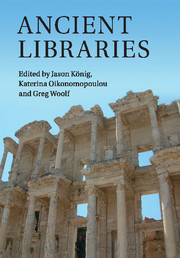
-
Select format
-
- Publisher:
- Cambridge University Press
- Publication date:
- 05 May 2013
- 25 April 2013
- ISBN:
- 9780511998386
- 9781107012561
- 9781316628843
- Dimensions:
- (247 x 174 mm)
- Weight & Pages:
- 0.99kg, 500 Pages
- Dimensions:
- (244 x 170 mm)
- Weight & Pages:
- 0.85kg, 500 Pages
You may already have access via personal or institutional login
Book description
The circulation of books was the motor of classical civilization. However, books were both expensive and rare, and so libraries - private and public, royal and civic - played key roles in articulating intellectual life. This collection, written by an international team of scholars, presents a fundamental reassessment of how ancient libraries came into being, how they were organized and how they were used. Drawing on papyrology and archaeology, and on accounts written by those who read and wrote in them, it presents new research on reading cultures, on book collecting and on the origins of monumental library buildings. Many of the traditional stories told about ancient libraries are challenged. Few were really enormous, none were designed as research centres, and occasional conflagrations do not explain the loss of most ancient texts. But the central place of libraries in Greco-Roman culture emerges more clearly than ever.
Reviews
'[An] important contribution to ancient cultural history.'
Source: The Times Literary Supplement
'The readability, immense variety and breadth of learning of the contributions to Ancient Libraries set a new benchmark, at a time when this subject is undergoing a welcome renaissance.'
J. Wasserstein Source: Bryn Mawr Classical Review
Contents
Metrics
Altmetric attention score
Full text views
Full text views help Loading metrics...
Loading metrics...
* Views captured on Cambridge Core between #date#. This data will be updated every 24 hours.
Usage data cannot currently be displayed.
Accessibility standard: Unknown
Why this information is here
This section outlines the accessibility features of this content - including support for screen readers, full keyboard navigation and high-contrast display options. This may not be relevant for you.
Accessibility Information
Accessibility compliance for the PDF of this book is currently unknown and may be updated in the future.


